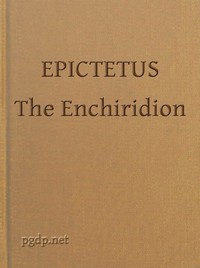The Enchiridion by Epictetus
"The Enchiridion" by Epictetus is a foundational text of Stoic philosophy written during the early Roman Empire, specifically in the 1st century AD. Classified as a philosophical manual, this work serves as a practical guide for advanced students of Stoicism, aiming to cultivate personal freedom and moral integrity through understanding what is within one's control. In "The Enchiridion," Epictetus emphasizes the importance of distinguishing between what is under our control—such as our
thoughts, desires, and intentions—and what is not—like wealth, health, and reputation. Through a series of concise teachings, he explains how these distinctions affect our emotional well-being. The text advocates for an attitude of acceptance towards external events while focusing on personal virtues and discipline. It offers practical advice on how to navigate daily life with composure and wisdom, illustrating key Stoic principles such as the necessity of self-control, the transience of life, and the value of living in accordance with nature. Overall, the work encourages readers to take responsibility for their inner lives and reactions, leading to a profound sense of freedom from external influences. (This is an automatically generated summary.)
Read or download for free
| How to read | Url | Size | |||
|---|---|---|---|---|---|
| Read now! | https://www.gutenberg.org/ebooks/45109.html.images | 104 kB | |||
| EPUB3 (E-readers incl. Send-to-Kindle) | https://www.gutenberg.org/ebooks/45109.epub3.images | 86 kB | |||
| EPUB (older E-readers) | https://www.gutenberg.org/ebooks/45109.epub.images | 84 kB | |||
| Kindle | https://www.gutenberg.org/ebooks/45109.kf8.images | 130 kB | |||
| older Kindles | https://www.gutenberg.org/ebooks/45109.kindle.images | 116 kB | |||
| Plain Text UTF-8 | https://www.gutenberg.org/ebooks/45109.txt.utf-8 | 90 kB | |||
| Download HTML (zip) | https://www.gutenberg.org/cache/epub/45109/pg45109-h.zip | 71 kB | |||
| There may be more files related to this item. | |||||
About this eBook
| Author | Epictetus, 55-135 |
|---|---|
| Translator | Higginson, Thomas Wentworth, 1823-1911 |
| Title | The Enchiridion |
| Note | Wikipedia page about this book: https://en.wikipedia.org/wiki/Enchiridion_of_Epictetus |
| Credits | Stephen Hutcheson, Chris Curnow and the Online Distributed Proofreading Team |
| Reading Level | Reading ease score: 70.0 (7th grade). Fairly easy to read. |
| Language | English |
| LoC Class | B: Philosophy, Psychology, Religion |
| Subject | Conduct of life -- Early works to 1800 |
| Subject | Ethics, Ancient |
| Category | Text |
| EBook-No. | 45109 |
| Release Date | Mar 10, 2014 |
| Most Recently Updated | Feb 12, 2023 |
| Copyright Status | Public domain in the USA. |
| Downloads | 4028 downloads in the last 30 days. |
| Project Gutenberg eBooks are always free! | |

